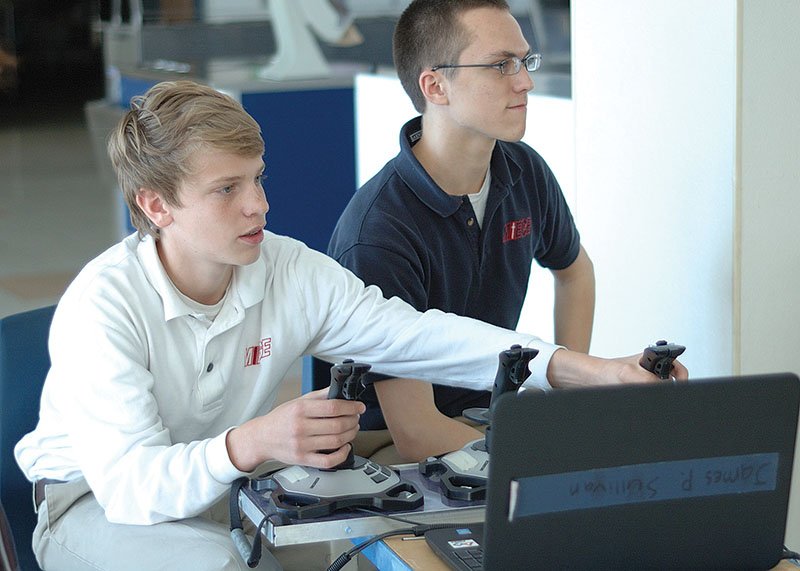
Bishop Miege students Aidan Gray, left, and Michael Heinzman demonstrate the robot designed by students in the high school’s robotics program. Leaven photo by Jill Ragar Esfeld.
Classroom contests build real-world skills
by Jill Ragar Esfeld
jill.esfeld@theleaven.org
ROELAND PARK — Ten index cards and a pingpong ball — those are the materials given to area eighth-graders as they learn about Project Lead the Way, a four-year engineering program available next fall at Bishop Miege High School here.
Seven minutes: That’s how long students have to build a tower strong and steady enough to support their pingpong ball.
Students are divided into teams of three. The team with the tallest tower wins a box of gumdrops.
With stakes that high, it’s a cutthroat competition.
Click on the photos below to view a series of images.
A lot of learning in a little time
When the activity was presented at Good Shepherd School in Shawnee recently, the room was filled with energy.
Student attempts at making tall towers were punctuated with frenzied discussions, furtive folding and stacking, and bursts of loud laughter as cards and ping-pong balls went flying.
Some students remembered they’d been given an index card when they walked in the room — giving their team an additional three cards . . . and a clear advantage.
Scott Anderson, head of Bishop Miege’s engineering department, presented the program with support from three students of the school’s very successful robotics program.
Anderson walked around the room with a tape measure, encouraging students to keep trying as he called out tower heights and the time left to beat them.
This instructor was having as much fun as the students, partly because he knew that in the midst of the fun, valuable lessons were being learned.
“Here’s the important question,” said Anderson after the competition was completed. “What did you learn?”
Students shouted out answers: “It was hard.” “It kept falling over.”
“What did the winning team do to keep it from falling over?” asked Anderson.
“They made the base wider,” several students responded.
“Not the only way to do it,” said Anderson, “but it was smart.”
That’s how Project Lead the Way works. Beyond the simple lessons in building a paper tower, students had seven minutes of intense practice in communication, problem solving and teamwork.
They found out there was no single right answer, but many possible solutions.
Engineering for everyone
Bishop Miege president Dr. Joe Passantino is excited to offer future Miege students four years of this kind of learning experience.
“Even though it’s an engineering curriculum,” he said, “the skills are transferable to any field a student would go into.
“Any profession is about problem solving and teamwork.”
During the tower-building activity, many students complained that they didn’t have enough time or enough materials.
Anderson’s response was the same to each: “You never have enough time or enough materials.”
It doesn’t take an engineer to know that’s a real-life fact of the working world.
And that’s the beauty of Project Lead the Way. Students learn to work together using critical-thinking skills to solve problems from a real-world perspective.
Passantino also noted that skills learned in the program will help students on any future test-taking endeavors — from the ACT and SAT to the GMAT or MCAT.
“They all require critical thinking,” he said. “So, if they’ve developed those critical-thinking skills, it’s only going to help.”
Students can also earn college credit through the program — beginning their freshman year.
“I think the college credit is another enhancement,” said Passantino. “No matter where students go or what they do, they’ll have that on their resume.
“It’s just something else that’s going to help them move forward.”
Project Lead the Way is a national organization with programs available in all 50 states. (See sidebar below.)
“It’s just such a solid program,” said Passantino. “They train the teachers. They have the curriculum with the software that’s needed for it. They have mentors for the instructors.
“It’s just a program that has proven to be very successful everywhere it’s been put in place.”
Only at Bishop Miege
Though most of the bigger public school districts have some form of the program, Bishop Miege will be the first Catholic high school in the Kansas City area to offer it.
Fortunately, they’re able to pattern their program after one successfully implemented in a similar school.
Dowling Catholic High School in West Des Moines, Iowa, has had Project Lead the Way Engineering as part of its curriculum for five years.
“I know the people at Dowling,” said Passantino. “The president is a good friend of mine, and I knew they had this program.”
Passantino and Anderson, along with two other instructors interested in teaching the engineering curriculum, went to Des Moines to observe.
“I know a lot of big districts have this program,” said Passantino. “But we’re just one single school, and that makes a difference.
“So, going up to Dowling was an opportunity to see, in a similar setting, how it might be applied.”
The trip motivated everyone involved to make Project Lead the Way part of Bishop Miege’s future.
“It was just very impressive,” said Passantino. “The activities in the classroom were so well-structured.
“Hearing their students describe how much they’re getting out of the class — our teachers were equally excited.”
Dowling has expressed an interest in helping Bishop Miege implement the program with equal success.
“That gave us a lot of confidence,” said Passantino. “It’s always better if you can find someone who has met the challenges, learned from them and can share that knowledge.”
Fall launch
Anderson, along with two other instructors, will be trained in the curriculum next summer. Project Lead the Way will be available at Bishop Miege for the fall semester of 2016.
“Most likely the first year we’ll only need one teacher,” said Passantino. “But we wanted some backups.
“We’ll outfit one classroom; our goal is to accommodate anyone who wants to get in the program.”
The only requirement for freshmen is enrollment in Algebra 1.
“While it does serve the honors and AP track of students,” said Passantino, “it’s also for students who maybe don’t fall into that category but are interested in these kinds of activities.
“It’s designed for pretty much the whole student body.”
And the whole student body, whatever their hopes and plans for the future, can benefit from the skills learned through Project Lead the Way.
The only challenge for students is going to be making the choice to fit this curriculum into their schedules.
“It’s going to be one more good choice they have available,” said Passantino. “It will be interesting to see how many sign up.
“Hopefully, this is the launch of something very special.”
Project Lead the Way
Project Lead the Way is the nation’s leading provider of science, technology, engineering and math (STEM) programs.
PLTW Engineering, being offered at Bishop Miege High School starting next fall, is about applying engineering, science, math and technology to solve complex, open-ended problems in a real-world context. Students learn how to apply STEM knowledge, skills and habits of mind to make the world a better place through innovation.
Even for students who do not plan to pursue engineering after high school, the PLTW Engineering program provides opportunities to develop highly transferable skills in collaboration, communication and critical thinking, relevant for any coursework or career.
For more information about PLTW or specific courses offered, go online to their website.







Great work Miege! Exciting times.